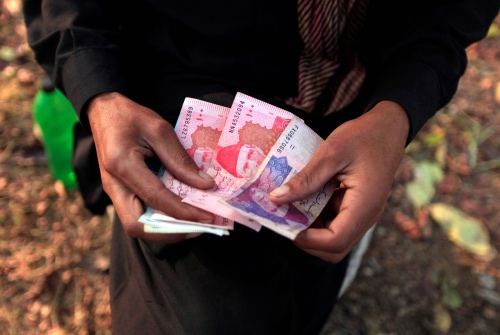Melbourne, Australia
Thomson Reuters Foundation
Improving poor people’s access to loans would make them less vulnerable to trafficking and slavery, a global expert said on Friday, as a new international commission met in Sydney.
The commission was set up last year to enlist the international financial sector in the fight to end modern slavery, one of the United Nations’ key global goals.

A man counts Pakistani banknotes along a roadside in Islamabad, Pakistan, on 16th November, 2017. PICTURE: REUTERS/Faisal Mahmood
It aims to fight money laundering by traffickers, promote ethical investment and offer better opportunities to people vulnerable to slavery.
“People who don’t have access to safe and reliable financial services end up working with unsafe lenders and creditors and unsafe labour markets to get access to income,” said James Cockayne, an expert on organised crime who is on the commission.
“Improving their access to safe financial services would be a way to drive down the risk factors of modern slavery,” he told the Thomson Reuters Foundation by phone.
About 25 million people worldwide are estimated to be victims of forced labour – found on farms, factories, and fishing boats – according to the United Nations’ labour agency.
The Financial Sector Commission on Modern Slavery and Human Trafficking was launched at the UN General Assembly in September and will release an anti-slavery roadmap for the financial sector this year.
It is a partnership between the governments of Liechtenstein, Australia and the Netherlands as well as the UN University in New York and various banks and financial institutions.
Australia last year became only the second country in the world after Britain to pass an anti-slavery law, requiring companies of a certain size to publish annual statements outlining the risk of slavery in their supply chains.
The head of the commission, which also includes slavery survivors, said the financial sector had a key role to play, particularly when it came to money laundering.
“We know that if you are a trafficker for example you need to launder your money somehow through the traditional banking finance sector,” said Fiona Reynolds.
The three-day meeting in Sydney began on Thursday and is focused on financial innovation and technology.
Existing technologies that could help vulnerable people include using online behaviour to assess credit worthiness and digital IDs for those who do not have state-backed identity documents, said Cockayne.
“Investors want data and tools and we’re looking at what are the tools that are required and can we help produce them or who is already producing them to put information in the hands of the people who need it,” added Reynolds.





